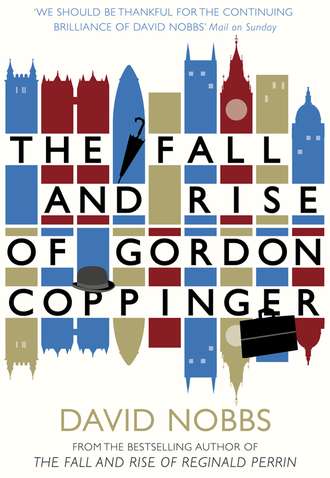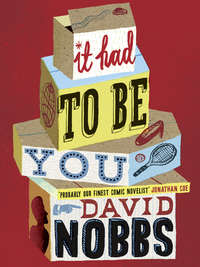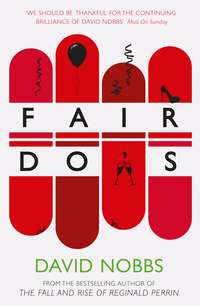
Полная версия
The Fall and Rise of Gordon Coppinger
Just as sleep is about to envelop him, there are two loud bangs from somewhere nearby. He is irritated rather than alarmed. He knows what they are. They are not the signal to start a revolution. They are not the first shots in a gangland battle. They are fireworks. Tonight is Guy Fawkes Night. He knows this because he knows that November the fifth is Bonfire Night, and he knows that it is November the fifth because he always knows the date. There are often pages of newspapers bouncing in the wind along London’s dirty streets, and although he may look half drunk and extremely filthy, he still has a good brain, and he has very little to feed it, so he grabs what scraps he can.
Now sleep will not come. He thinks back to all those Bonfire Nights in Dudley, watching the municipal fireworks display with his brothers, gasping with shared astonishment, which was about the only thing they shared. They weren’t allowed to have fireworks themselves. There were a lot of things they weren’t allowed to have. They weren’t allowed to go to the swimming pool in case they contracted polio. He enjoyed the Saturday-morning film shows but his two brothers had grown out of such things, if indeed they had ever been into them. His elder brother almost certainly hadn’t. He had no sense of fun. There hadn’t been any point in playing games with him. He had no talent for games.
The middle brother, now, he had been different. He had been rather good at games, at make-believe, but he had never had the time. He had never had the time for anything, really, except for making money. He used to go to the baker’s, buy cakes, take them home, and cut them into pieces – rather small pieces to be honest – and sell them by the slice. He preferred that to any game, which was a pity.
Does the man in the privileged position beside the warm-air outlet welcome these reminiscences, or are they an irritation which prevents him from sinking into the unconsciousness he craves, if indeed he does crave it? How does he feel about his lifestyle? Is he happy? Is he sad? Is he resigned? Is he bitter?
What goes on inside his head is actually the only privacy he has left in his life. Perhaps we have intruded enough.
Staring at himself with astonishment
This was the bit that he liked best – the moment before anybody arrived. He stood in the middle of the enormous drawing room, rich in plump settees and elegant standard lamps, two of them in the art deco style – who said he was a philistine? On the walls hung a Cézanne, two Pissarros and a Stanley Spencer – again, who said he was a philistine? Log fires crackled gently at both ends of the great room. They were known as the west fire and the east fire. Some people described this as affectation, but Lady Coppinger said that it was necessary in order to give definite and simple instructions to the servants.
He walked slowly through the ground floor of his ‘cottage’, and every prospect pleased him.
The rosewood (what else?) dining table, the long rustic table in the far kitchen and the trestle tables erected for the occasion in the conservatories were all beautifully laid with plates of rare beef, pink lamb, pork with liberal crackling, smoked duck, venison sausages, five moist whole salmon that had once been wild, six stuffed trout that hadn’t been too pleased either – the old jokes were the best in Sir Gordon Coppinger’s book. It was all so quintessentially British, to use Peregrine Thoresby’s favourite word. Not a salami or a snail in sight. Good old Siobhan.
In the vast entrance hall with its anachronistic Doric pillars, the two lovely Pembroke tables were bedecked with all the rich promise of alcoholic excess. On the table to the left were bottles of champagne and long antique flutes. On the table to the right bottles of red wine stood opened and breathing and were surrounded by glasses of a size to cheer the most sombre of hearts. All the wine was British. It pained Sir Gordon not to be able to serve great French wine, but his reputation as a patriot was paramount.
The serving staff stood at their posts, young enough, smart enough, alert enough and attractive enough to pass muster even to this stern critic. Good old Siobhan.
Oh, it was wonderful. The food elegant and untouched, the bottles full, the glasses gleaming, the carpets spotless, and Lady Coppinger safely in her dressing room deciding which shade of lipstick to favour and which necklace to wear.
He climbed the stairs with the energy of a young man, and made a final security check round the eight bedrooms, the three dressing rooms and the eight bathrooms, six of which were en suite. Everything was as it should be. He’d known that it would be but he was glad of the excuse to look round and admire his cottage without seeming smug about it.
He switched off the lights on the landing that would have seemed long enough and wide enough to be called a gallery if he hadn’t been to Flaxborough Hall so recently, and peered out of one of the windows into the impenetrable dark. The rain hadn’t amounted to much, the bonfire would burn well. In a couple of hours this dark sky would be alive with bright colours and sensational patterns.
He could just see, through the gently swaying trees, the lights in Top Field, where a marquee had been set up to serve beer and wine and pork pies and sausages (not venison) to the good people of Borthwick End, Borthwick Magna and Borthwick Juxta Poynton. How generous I am, he thought, to allow them to marvel at the sensational waste of money which is at the heart of this evening at this critical economic moment in our island’s story.
Yes, this was the bit he liked best. Soon they would be here, headlights frightening the owls in the trees that lined the drive, tyres churning up the grass in the Front Meadow and the Back Meadow, exclamations of astonishment as if they’d never seen tables laid with food before, the wild salmon and the unhappy trout skeletonized before his eyes, and the chatter, the roar of the trite remarks of 250 people, what did they find to talk about? The showy coats piled on the beds in the guest bedrooms, the crumbs and wine stains on the carpet, the soiled bowls in the many lavatories, it would be downhill from now on.
He braced himself against the invasion. He consulted the database in his head. He must be prepared.
People invited included his elder brother Hugo; his doctor Hamish Ferguson and Mrs Ferguson; his centre forward Raduslav Bogoff and his not so svelte wife Svetoslava Bogoff; his creative left-side midfielder Danny Templeton and Mrs Templeton; his goalkeeper Carl Willis and Mrs Willis; Keith Gostelow, Dan Perkins, and Adam Eaglestone from GI (Keith Gostelow and Adam Eaglestone accompanied by their better halves, Dan Perkins accompanied by his worse half); his daughter Joanna, accompanied by nobody; Siobhan and Liam McEnery; Field Marshal Sir Colin Grimsby-Watershed (retired) and Lady Grimsby-Watershed (retired); Admiral Lord Feltham of Banbury (retired) and Lady Feltham; Gloria Whatmough, Head of Charitable Giving, and her friend June Wellington; Peregrine Thoresby, Curator of the Coppinger Collection and his partner David Emsley; and, last but least, his son Luke and his latest girlfriend, Emma Slate.
People not invited included his younger brother Jack; his deceased mother Margaret; Fred Upson; Martin Fortescue; Helen Grimaldi; Kirkstall; Alice Penfold with her stud and ring; Fiona Bruce; A.A. Gill; Giles Coren; the Mayor of Dudley; Mandy of Hair Hunters of Hackney; Francesca Saltmarsh of the Perseus Gallery with the sweetest little bedroom upstairs; and Jenny Boothroyd, Sandy Lane, Isla Swanley, Kerry Oldstead, Gill Goldthorpe, and Ellie Streeter, all of whom he had taken to his secret seduction suite on the twenty-second floor during the last six months.
The phone rang, loud and shocking in this last moment of silence.
A few moments later, Farringdon called out to him.
‘A Mr Liam McEnery on the telephone for you, sir.’
‘Thank you, Farringdon.’
He approached the phone as if it was an unexploded bomb.
‘Coppinger.’
‘I’m so sorry to bother you when you must be so busy, Sir Gordon.’
Yes, so get on with it.
‘I’m afraid we aren’t going to be able to come, sir.’
No Siobhan! What do I do if things go wrong? How selfish is this, to let me down at this late hour?
‘It’s the wee mite, sir.’
Oh, bloody Ryan. Might have guessed it. Children! Bastards!
‘I’m afraid he’s not well, sir.’
‘Oh dear. Nothing serious, I hope, Liam.’
‘I’m afraid it may be, sir. We’ve had to rush him to Great Ormond Street Children’s Hospital.’
‘Oh, I’m so sorry.’
This really is very inconvenient, though. Why are kids always so inconvenient? And who will orchestrate the evening now?
‘Please give Siobhan my very best wishes, and tell her not to worry at all about the party, I’m sure her planning is absolutely foolproof.’
‘Thank you, sir. She’ll appreciate that.’
First arrivals. Suddenly Lady Coppinger sailed out from the harbour of her bedroom, exuding welcome, dripping with real pearls and false charms.
‘Hello! Oh, you look gorgeous.’
‘Well, so do you.’
‘And that new rose you bred last year. Divine. What was it called again?’
‘The Crimson Rambler.’
‘Marvellous.’
‘Thank you.’
They were off. It had begun. Siobhan was forgotten.
Who the hell are this couple? Quick, access the database of the brain, search. Ah, yes. Stanley Welton, the big cheese at Stilton (ha, ha) and Mrs Welton. ‘How are Olivia and Toby?’ ‘Oh, how clever of you to remember.’ We’re off, we’re at the races, who needs Siobhan? I can do this.
Chat, chat, chat. Sip, sip, sip.
The chosen footballers of Climthorpe United were among the first to arrive, awkward in their suits, none more awkward than Raduslav Bogoff. They had a Derby match against Charlton next day, and to invite so many of them tonight had been to indulge that love of risk that is an essential ingredient of the make-up of all great men.
‘Good luck against Charlton tomorrow, Raduslav,’ said Sir Gordon, ‘and don’t rush it in front of goal.’
‘Oh no, Sir Gordon. Tomorrow I am cool. Tomorrow I am ice.’
‘Excellent. And Raduslav? Don’t drink too much tonight.’
‘Oh no, I not, sir. I am Bulgarian. I no have this culture of booze.’
‘Great stuff. Good man.’
The manager, Vernon Thickness, and his absurdly blonde wife Claudia walked in on either side of the little gaggle of footballers as if they were two sheepdogs directing them towards the pen.
‘Hello, Vernon. Hello, Claudia. Going to stuff Charlton tomorrow, are we, Vernon?’ asked Sir Gordon.
‘Absolutely. Close down their wingers and they’ve no Plan B.’ Vernon Thickness narrowed his eyes, which was difficult as they were narrow already. ‘And don’t worry about them drinking too much tonight. I’ll be watching like a hawk.’ He did his hawk impression. ‘Anyone who drinks too much tonight is out. O U T. Out.’
Your spelling’s improved, thought Sir Gordon. Let’s hope your tactical awareness has too. But he didn’t say this. There were some things even Sir Gordon didn’t say.
They were pouring in now, and there was such a business of handing over coats and getting drinks that he had the unpleasant feeling of being surplus to requirements in his own entrance hall. He decided that it was better to return to the drawing room, which was filling up already.
Lady Coppinger approached him, gave him a sweet kiss on the cheek and said, ‘Darling, you look gorgeous tonight.’ She turned to the people who were drifting in the wake of her perfume. ‘I’m so proud of my man.’
Sir Gordon almost showed his shock before he realized that this was a public performance, overdone in order to hurt him. And, briefly, it did hurt him. A shaft of pain went through him as he recalled the times when such things might have been said and meant.
The drink flowing. The noise rising. The locals in Top Field getting frisky already. The chauffeurs in the Back Meadow and the Front Meadow running their engines to keep warm. Cost of fuel immaterial, they don’t have to pay. Global warming, global schwarming.
‘More bubbly?’ ‘Please.’ ‘Crisis? What crisis?’ Who cares about the Greeks anyway? They can whistle for those marbles.’ ‘No wonder they want them, they’ve completely lost theirs.’ ‘Very good! Quite right! Bastards!’ ‘Nobody pays tax in the whole of Southern Europe, they’ll go to the wall and take us with them. Bastards.’
There was a sheikh in the room. He hadn’t invited a sheikh. Hadn’t got anything in particular against sheikhs, take them or leave them really, that was his attitude to sheikhs, but what was he doing here? Have to ask Siobhan. Oh, damn, couldn’t. Better ask the fellow himself. How do you address them? Excuse me, Your Sheikhship, and I hope this doesn’t sound rude, but who exactly invited you?
He started to part the crowds, feeling slightly like Moses, to get to the sheikh, but then he saw his dad, standing by the door looking utterly and totally lost. What was he doing here? Who’d invited him? He made his way over to Christina, who was holding court.
‘Sorry to break in, sweetest –’ God, that was difficult to say – ‘but did you invite Dad?’
‘Yes, all the happy family together, Gordon, on this very public occasion.’
‘Bit risky, isn’t it?’
‘He’ll be fine.’
Women! That was women all over. Make a gesture, create havoc. Better say nothing, though.
He hurried over towards his dad, feeling, though he was too anxious to realize it, a genuine shaft of emotion for the first time in the evening.
His father’s cheeks were shrunken and his eyes were hiding in panic at the backs of their sockets.
‘Dad!’
Say ‘Dad’ at regular intervals, and he just might put off that moment he dreaded, the moment when he had to face for the first time the fact that his father didn’t know who he was.
‘How are you, Dad?’
‘I’ve lived too long.’
Quite right.
‘No! Never!’
‘Where am I?’
‘You’re at my house.’
‘But it’s huge.’
‘I’m very rich, Dad.’
‘Are you? Good Lord. I never was. Was I?’
‘No, Dad, you weren’t, but you did all right.’
‘Did I? Oh, good. Where’s Margaret?’
Margaret’s dead, Dad. No point. Wouldn’t remember, why hurt him?
‘Probably checking her make-up.’
‘That’ll be it. Who’s that boy over there who’s in love with his hair and isn’t in love with that woman who looks as if she doesn’t wash?’
Good God. So few corners of the brain left active, and still such perception.
‘That’s your grandson, Dad. Luke.’
‘Ah! Thought I recognized him. You must introduce me some time.’
He found a seat for his dad and looked round for someone to go and talk to him. His eyes lit upon a nun. A nun! What was she doing here? He hadn’t invited a nun. What did Siobhan think she was doing inviting a sheikh and a nun? He must talk to Siobhan. Oh, blast. He couldn’t. Perhaps he could ring the hospital. No. Insensitive. A picture flashed across his mind, anxious parents at a bedside. A wee mite struggling to breathe. Oxygen.
He managed to reach the nun. No time to ask her why she was here.
‘Excuse me. I don’t know you, but obviously as a nun you have compassion.’
Strangely attractive. He’d never had a nun. No! Gordon, get a grip.
‘My dad … that’s him in that chair … he’s eighty-six … he’s got dementia … he’s frightened … will you talk to him, calm him down? … Please.’
‘Of course. Don’t worry.’
‘Thanks.’
‘No problem.’
He was disappointed to find that even nuns said ‘No problem’.
He tried to make his way over to Luke, but his path was blocked by Hugo, immaculate to excess and as supercilious as a cat.
‘Posh do, Gordon.’
‘Well, you know.’
‘Yes. Keeping up appearances.’
‘What do you mean by that?’
‘Stop looking for hidden meanings. Anyway, I can see I’ll have to pull my socks up next year.’
‘Don’t be ridiculous, Hugo. You top me every time. Last year was fantastic.’
‘It was good, wasn’t it? Still, this looks lovely. Where’s Christina?’
‘Oh, here, there, everywhere. Being charming.’
‘Not being charming, Gordon. She is charming.’
‘You don’t live with her.’
Hugo gave the very faintest twitch.
‘True. Very true.’
Sir Gordon edged closer to Luke. A quick look showed his father chatting happily with the nun. Maybe Siobhan had known what she was doing inviting her.
At last he was with Luke. They shook hands. The formality seemed odd, but a kiss was out of the question.
‘Dad, this is Emma Slate.’
The worst yet.
‘Delighted to meet you, Emma.’
‘Really? Luke said you’d hate me.’
‘Well, give me a chance. I haven’t had time yet.’
Uneasy laughter. Good.
‘I may as well tell, you, Sir Gordon –’ there was a look of defiance on her face, plus an element of fear that if she wasn’t careful she might look attractive to men she despised – ‘that I came here under duress.’
‘Not the quickest way. I recommend coming through Esher and Epsom. Any more vandalism, Luke?’
‘Not yet.’
‘Oh, don’t be such a pessimist, Luke, why should there be any more?’
‘I just have a feeling, Dad.’
‘Luke gets these feelings, Sir Gordon.’
‘Oh, does he? I wouldn’t know, Emma. I don’t know him as well as you.’
‘Dad!’
‘Well, I don’t.’
‘Whose fault is that?’
‘Oh look, Luke, not today.’
‘OK. Right. No, I think I must have – or we must have because you were mentioned as well – offended the Welsh in some way.’
‘Well, that isn’t difficult. So, Emma, are there a Mr and Mrs Slate?’
‘No, I was produced by artificial insemination.’
‘Emma!’
‘I’m sorry, Luke, but I just hate telling people. It’s such a conversation stopper. No, there isn’t a Mr Slate or a Mrs Slate. Both my parents are dead, Sir Gordon. They drowned in Tenerife.’
Emma was right. It was a conversation stopper.
Now, as the buzz grew louder, the crowd thicker, he noticed, out of the corner of his eye, two people, the sight of whom demanded instant attention – his daughter Joanna, and a Greek Orthodox priest. It was no contest. He approached the priest with determination in his step.
‘Excuse me … I don’t know you … I’m … I’m Sir Gordon. Your host.’
‘Lovely party.’
‘Thank you. I … um … I have no wish to be in any way offensive, and I … I have no idea of how one is supposed to address a Greek Orthodox priest.’
‘A Greek Orthodox archbishop.’
‘Oh my goodness. Then perhaps I ought to call you “Your Beatitude”.’
‘That will do splendidly.’
‘Good. I have to ask you, Your Beatitude, who invited you?’
‘You did.’
‘Me?’
‘Well, not personally, but the invitation was from you.’
‘You received an invitation?’
‘I received an invitation and both as a Greek citizen and as a senior representative of Our Lord here on earth I find your attitude to me somewhat offensive.’
‘I have to say that I am not thrilled by your attitude, Your Beatitude.’
‘I will show you the invitation but I do so under protest.’
‘There’s really no need. I accept your word.’
‘I insist.’
‘Very well.’
The invitation looked exactly like the design that Siobhan and he had devised, and the words too were as they had agreed. If it was a forgery, it was a good one. He would need to phone Siobhan.
But could he? The image returned, Ryan’s breathing now faint, Liam holding Siobhan’s hand, a doctor and two nurses staring at the graph of the wee mite’s heart; it was terrible, compassion flooded into Sir Gordon, and he had no defence against it, having hardly felt any for as long as he could remember.
He took his mind off it by wondering what it would be like to have sex with a nun, in her cell, right next to the Mother Superior’s. It didn’t work very well.
And then he realized that he had the perfect antidote to compassion right there standing in front of the east fire. His daughter Joanna.
It was the sagging of the shoulders that did it, he decided. The whole body might look better if she stood up straight. Even the clothes, which looked as if they’d been bought in a charity shop the day it closed down, might look better if she stood up straight. And the hair. He’d a good mind to send her a voucher for six free visits to Hair Hunters of Hackney.
Oh, Joanna, the day you were born … our hopes.
‘So, darling, how are you?’
‘Oh, you know, Dad. So-so.’
Never ill. Never well.
‘Well, it’s the time of year.’
Gordon, you can do better than that.
‘Yes, I hate this time of year.’
You hate every time of year. Too hot. Too cold. Too wet. Too dry. Too average.
‘Looking forward to Christmas?’
Oh, come on, Gordon, sparkle. It’s Guy Fawkes Night.
‘Not really, Dad. I don’t much like Christmas actually.’
Not even positive enough to hate it.
‘And it all starts ridiculously early these days.’
I entirely agree, in fact I’d go further, it’s ludicrous, it’s greedy, it’s self-destructive, but can’t we try to be positive tonight? It is a party. Abandon Christmas. Change the subject.
‘How’s the job?’
‘Oh, you know.’
‘Well, you could have worked for me.’
‘Oh, Dad, don’t. You know I don’t want favours. You know I want to make my own way in the world.’
But you haven’t.
‘I know what you’re thinking. You’re thinking I haven’t made much of a way, but it’s my way.’
And you can’t sing like Frank Sinatra either.
Suddenly, the banging of a gong broke through the rising chatter. More bangs, cries of ‘Shh’, and silence fell in the great triple-glazed, triple-gabled house specially designed for a soap magnate who needed two swimming pools and so amusingly called his mansion a cottage, ha, ha.
‘Ladies and gentlemen,’ intoned Farringdon. ‘Your host, Sir Gordon Coppinger, wishes to say a few words. If you would make your way, as many of you as can squeeze in, to the drawing room.’
Sir Gordon hurried through to get to the front while he still could. Farringdon passed the microphone over to him. He tried not to look at the throng. He didn’t want to see the sheikh, the nun or the archbishop. They sounded like a bad joke, but in fact their presence alarmed him. He didn’t want to see his frightened dad, his listless daughter, his inept son, his insincere wife. He wanted to forget his unhappy life. What?? Unhappy?? No!!
He’d paused too long. He must begin. But to have had these thoughts at this very moment … how could he cope?
Of course he could cope. He was a great man, wasn’t he?
Wasn’t he?
He coped.
‘Ladies and gentlemen …’ he began. ‘Ladies and gentlemen … I’m not going to make a speech. Too many people make too many speeches. I’m going to say just a few words. As you may know, my brother Hugo and I host a Guy Fawkes party in alternate years, and this year it’s my turn, so … welcome. Welcome, each and every one of you. Guy Fawkes Night. We celebrate a failure. How very British. Well, I don’t much like failure. In fact, I think I can say that I’m a stranger to it. So, my simple message is this. Don’t talk Britain down. Don’t even contemplate failure. Cut the word “crisis” from your vocabulary. Let’s start tonight. Let’s make this night a huge success. Ladies and gentlemen, you will find tables laden with food in the dining room, in both the conservatories, and in the far kitchen. Don’t rush, there’s plenty for everybody. Enjoy.’
The minute he had finished speaking he felt as if his words had been utterly hollow. He stood there in his crowded home, and felt utterly alone.







